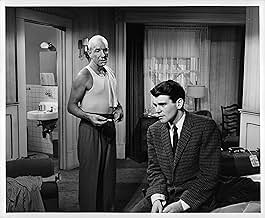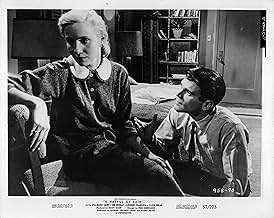IMDb RATING
7.1/10
1.7K
YOUR RATING
A Korean War veteran's morphine addiction wreaks havoc upon his family.A Korean War veteran's morphine addiction wreaks havoc upon his family.A Korean War veteran's morphine addiction wreaks havoc upon his family.
- Nominated for 1 Oscar
- 6 wins & 10 nominations total
Gerald S. O'Loughlin
- Chuch
- (as Gerald O'Loughlin)
Tom Ahearne
- Bartender
- (uncredited)
William Bailey
- Man in Elevator
- (uncredited)
Gordon B. Clarke
- Middle-Aged Man
- (uncredited)
Heinie Conklin
- Barfly
- (uncredited)
Albert Dannibal
- The Thin Man
- (uncredited)
Sayre Dearing
- Barfly
- (uncredited)
Art Fleming
- Jack
- (uncredited)
Jane Hoffman
- Lone Woman
- (uncredited)
Jason Johnson
- Boss
- (uncredited)
Jay Jostyn
- Doctor
- (uncredited)
Featured reviews
Ah...the wealth of info that this website provides...never knew that our old pal Michael Gazzo wrote this play/screenplay...another piece of "Godfather" trivia I can now pepper my pals with....
And William Hickey's voice was a marvel of genetic engineering even back in his debut film...
"Hatful" may appear somewhat dated by today's standards and the direction and performances still seem more stage than film-oriented..but love seeing the old Brooklyn waterfront and those ESSO gas signs again...and the cast puts in a fine day's work...
If you liked this one...put "The Lost Weekend", "Man With The Golden Arm" and "Days of Wine and Roses" on the to-do list for comparison shopping purposes.
(And for you Tony Franciosa fans out there...you can now turn your attention to line 2 of Tom Waits' "Goin' Out West").....
And William Hickey's voice was a marvel of genetic engineering even back in his debut film...
"Hatful" may appear somewhat dated by today's standards and the direction and performances still seem more stage than film-oriented..but love seeing the old Brooklyn waterfront and those ESSO gas signs again...and the cast puts in a fine day's work...
If you liked this one...put "The Lost Weekend", "Man With The Golden Arm" and "Days of Wine and Roses" on the to-do list for comparison shopping purposes.
(And for you Tony Franciosa fans out there...you can now turn your attention to line 2 of Tom Waits' "Goin' Out West").....
My summary might scare off some, but this is not the infamous "Reefer" movies of earlier days. This film has a great cast, who work with a great script. Don Murray plays an unlikely addict because he acquired his habit as a wounded soldier. His addiction and effects on himself and family are the plot focus. The actors draw out our pity and condemnations. The film does not preach about addiction. The film does portray an ugly problem about drugs, be they legal or illegal. My generation which came to age in the 60's saw many films which showed the "fun" side of getting smashed or high. A great number of them are no longer living, or are shadows of themselves because of addiction.
Intense and harrowing family drama typical of 50's style New York film-making. At the time, Hollywood was caught up in the double-whammy of TV competition and Cold War scare, so programming from the West Coast tended to emphasize big screen spectacle and politically safe subject matter. On the other hand, films from New York City, such as On the Waterfront and Edge of the City, emphasized small screen black & white, with urban settings and grittier subject matter.
Here it's drug addiction among a white-collar family ensconced in a Manhattan apartment. Hooked because of a war wound, Johnny (Don Murray) has a loving wife Celia (Eva Marie Saint), a loyal brother Polo (Anthony Franciosa), and an arrogantly insensitive father (Lloyd Nolan). There's real tension between husband and wife because Johnny is fearful of confessing his secret addiction. As a result, Celia feels neglected by his drug-created absences, while Johnny keeps losing jobs, and Polo ends up paying for his brother's habit. When Dad comes from Florida to collect promised money from Polo that he now doesn't have, events begin spiraling out of control.
Needless to say, acting here is front and center stage. The cast comes through beautifully, especially Franciosa as the intensely conflicted Polo who's attracted to his brother's wife while providing Johnny the needed support. And it doesn't help that Dad has always favored Johnny even as Polo must keep that same brother's ruinous secret. Poor Polo, the stress may appear to be on Johnny and his addiction, but it's really Polo who's emotionally torn.
This is not a movie for the depressed. Nearly all the scenes take place in the couple's rather drab apartment, except for a few street shots of Johnny trapped by Manhattan's towering impersonality. This is urban despair 50's style, when drugs and addiction were considered a strictly urban problem related to unwholesome types that thrived there. The darker skinned drug-pusher Mother (Henry Silva)) conforms to a popular stereotype of the time, along with his be-bopping confederate Apple (Bill Hickey), another popular stereotype. And when Mother says it's only business after threatening Johnny, we get a different perspective on the rise of post-war commercialism. (Why the lugubrious name "Mother" for a low-life drug dealer? My guess is that it characterizes in ironic fashion the dependent relation addicts have with their supplier.)
The image that stays with me is a strung-out Johnny, hunkered down in his coat, drifting alone on the streets of Manhattan. It's a grim existential moment, especially for that upbeat decade. Anyway, the movie remains a dramatic powerhouse that still packs a wallop. And even that bane of 50's films, the required happy ending, is finessed in suitably ambiguous fashion.
Here it's drug addiction among a white-collar family ensconced in a Manhattan apartment. Hooked because of a war wound, Johnny (Don Murray) has a loving wife Celia (Eva Marie Saint), a loyal brother Polo (Anthony Franciosa), and an arrogantly insensitive father (Lloyd Nolan). There's real tension between husband and wife because Johnny is fearful of confessing his secret addiction. As a result, Celia feels neglected by his drug-created absences, while Johnny keeps losing jobs, and Polo ends up paying for his brother's habit. When Dad comes from Florida to collect promised money from Polo that he now doesn't have, events begin spiraling out of control.
Needless to say, acting here is front and center stage. The cast comes through beautifully, especially Franciosa as the intensely conflicted Polo who's attracted to his brother's wife while providing Johnny the needed support. And it doesn't help that Dad has always favored Johnny even as Polo must keep that same brother's ruinous secret. Poor Polo, the stress may appear to be on Johnny and his addiction, but it's really Polo who's emotionally torn.
This is not a movie for the depressed. Nearly all the scenes take place in the couple's rather drab apartment, except for a few street shots of Johnny trapped by Manhattan's towering impersonality. This is urban despair 50's style, when drugs and addiction were considered a strictly urban problem related to unwholesome types that thrived there. The darker skinned drug-pusher Mother (Henry Silva)) conforms to a popular stereotype of the time, along with his be-bopping confederate Apple (Bill Hickey), another popular stereotype. And when Mother says it's only business after threatening Johnny, we get a different perspective on the rise of post-war commercialism. (Why the lugubrious name "Mother" for a low-life drug dealer? My guess is that it characterizes in ironic fashion the dependent relation addicts have with their supplier.)
The image that stays with me is a strung-out Johnny, hunkered down in his coat, drifting alone on the streets of Manhattan. It's a grim existential moment, especially for that upbeat decade. Anyway, the movie remains a dramatic powerhouse that still packs a wallop. And even that bane of 50's films, the required happy ending, is finessed in suitably ambiguous fashion.
10mkosko
My first viewing of this movie was when i was eleven years old. It was being aired on the Friday night late show. I found it to be a gripping tale of a Korean war veteran returning home with a heroin addiction which was brought on from battle wounds recieved during the conflict.After that point was established you tend to feel for Johnny Pope and his family. A hero in his fathers eyes with his brother Polo paling in comparison in dads opinion. Johnny's wife and brother do everything they can to cope with his addiction and keep John Sr. in the dark about it building to the eventual climax when the truth comes out.A well written and acted tale that left an impression on me.
A Korean war veteran (Don Murray) has developed a raging heroin habit which he hides from his pregnant wife (Eva Marie Saint)and his father (Lloyd Nolan). He has those classic "I've got a monkey on my back" mannerisms which the audience can appreciate, while the wife and father wonder why he seems nervous all the time. His dealer, a character known as Mother, played by Henry Silva, and Mother's sidekick, a beatnik type known as Chuch, played by Gerald S. O Laughlin, are memorable characters. Murray is great as his desperation grows, in debt to Mother, trying to keep his problem a secret, pushed to the extreme. The powerhouse drama features an utterly fantastic role, played by Anthony Franciosa, as Murray's heavy drinking brother, who protects Murray but is in love with his wife at the same time. It could have all been too stagey, but thanks to director Fred Zinneman, there's action to spare in this gritty New York drama.
Did you know
- TriviaAnthony Franciosa was nominated for a Tony Award for his performance as Polo in the original Broadway production. He was nominated for an Academy Award® for reprising the role in this film. Features Franciosa's only Oscar®-nominated performance.
- GoofsWhen Johnny surprises Celia with dinner and flowers, the camera starts to back out of the kitchen, but something or someone runs into the curtain hanging on the right, causing it to move quite a bit.
- Quotes
John Pope, Sr: Polo, You're a bum. You always were and you always will be.
- ConnectionsReferenced in What's My Line?: Lew Hoad & Shelley Winters and Anthony Franciosa (1957)
- SoundtracksDon't Get Around Much Anymore
(uncredited)
Music by Duke Ellington
[Played at Marty's Bar after Pop and Johnny show up]
- How long is A Hatful of Rain?Powered by Alexa
Details
Box office
- Budget
- $1,820,000 (estimated)
- Runtime
- 1h 49m(109 min)
- Color
- Aspect ratio
- 2.35 : 1
Contribute to this page
Suggest an edit or add missing content



































